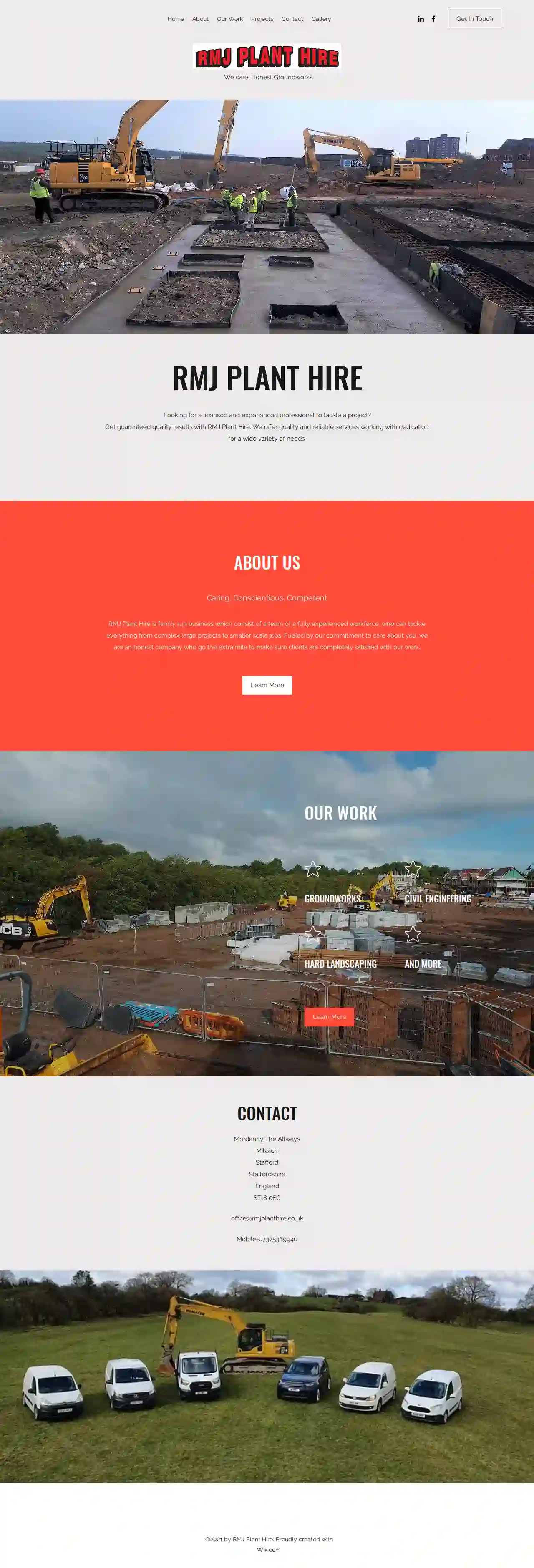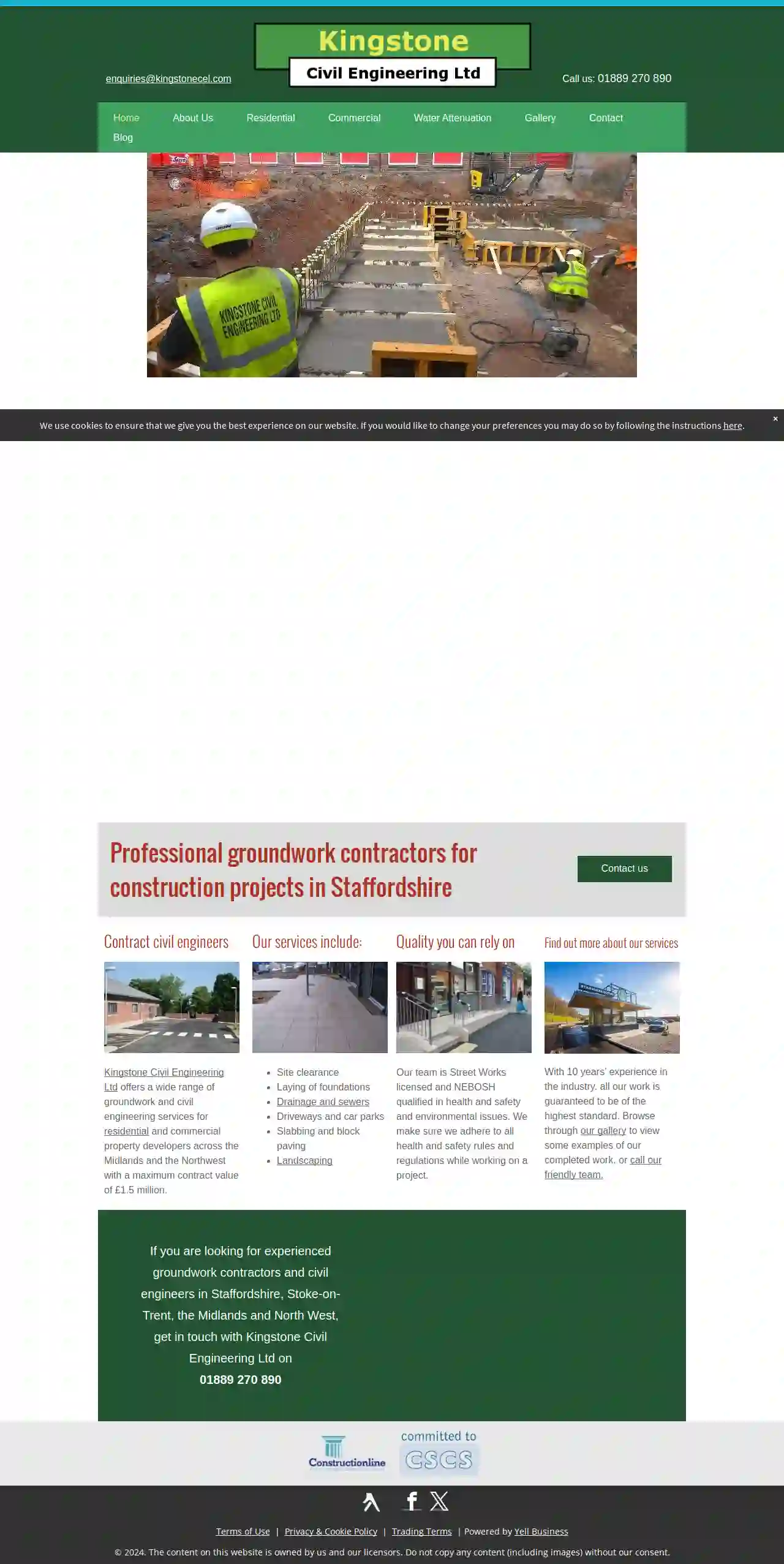Demolition Contractors Stafford
Find Demolition Contractors in Stafford
Receive 3 FREE Demolition Companies quotes for your project today! Compare profiles, reviews, accreditations, portfolio, etc... and choose the best offer.

Addpost Ltd. Groundworks & Civil Engineering Contractors.
53 reviewsStoke-On-Trent, GBAddpost Ltd: Your Trusted Groundworks and Civil Engineering Partner Addpost Ltd is a well-established and reputable groundworks and civil engineering contractor based in Stoke-on-Trent, Staffordshire. We have a proven track record of delivering high-quality projects on time and within budget. Our team of experienced professionals is dedicated to providing our clients with the best possible service. We are committed to safety, quality, and customer satisfaction. We offer a wide range of services to meet the needs of our clients, including: • Groundworks • Civil Engineering • Concrete Structures • Drainage & Water Management • Earthworks • Foundations • Ground Retention We are proud to serve clients in Stoke-on-Trent, Staffordshire, Cheshire, and the surrounding areas. We are committed to providing our clients with the highest level of service and workmanship. Contact us today to discuss your project needs.
- Services
- Why Us?
- Gallery
Get Quote
John F Hunt Regeneration
1Stafford, GBYour Trusted Partner for Brownfield Enabling Helping you create value from industrial legacy and brownfield sites HOW WE CAN HELP YOU John F Hunt Regeneration is a trusted partner for industrial demolition, land remediation and brownfield enabling services. We are committed to finding effective ways to increase the value of and de-risk your industrial legacy sites using innovative, industry-leading and sustainable techniques, whilst aiming to achieve zero carbon by 2050. Our real-world experience of demolition, dismantling, land remediation and water treatment provides our clients with unrivalled support. Our business has been built on experience, integrity and hard work. We can offer you the highest level of service and expertise, while leading the industry in best practice and good governance. As part of the John F Hunt Group we have the financial stability to provide a completed works package no matter the size of the scheme.
- Services
- Why Us?
- Gallery
Get Quote
Staffordshire septics and drainage ltd
4.54 reviewsGarshall Green, Milwich, ST18 0EP, GBStaffordshire Septics and Drainage – Rapid Repair And Installation Of Septic Tanks And Drainage Systems Originally I started life in engineering but I soon realised that I was not enjoying life in a factory and I really wanted to work outdoors. So I left to attend agricultural college which would give me a more rewarding career outdoors. When I graduated from college just over 20 years ago now I initially set up a ground works company which covered all aspects of ground work from surfaces to drainage. I enjoyed running the company for many years and grew to a point where I had several employees. About five years ago I was getting more and more involved in septic tanks and drainage which I found to be the most interesting part of my business, and when in 2015 the government and environment agency created a document called the 2015 binding rules I invested many days and hours researching and learning this legislation so I knew that all the work I carried out would be compliant. It was then I decided it was time to focus on doing what I enjoy most, drainage! And so Staffordshire Septics and Drainage ltd was born. Since then we have helped many customers with everything from compliance issues to blocked drains. We are also fortunate enough to sponsor a heavy horse show team who everyone gets to see at many county shows around the country. Is Your Septic Tank Compliant? Contact us to arrange a survery Areas Covered: Staffordshire, Derbyshire, Shropshire, West Midlands, Cheshire Why Choose Us Comprehensive service Emergency Call Out 24 Hour Service Credit / Debit Cars Accepted Maintenance Contracts Available Check a Trade approved 9.8 average review Specialist knowledge in 2015 Binding Rules Compliance
- Services
- Why Us?
- Testimonials
- Gallery
Get Quote
RMJ Plant Hire
1Milwich, Stafford, Mordanny The Allways, ST18 0EG, GBCaring, Conscientious, Competent RMJ Plant Hire is a family-run business with a team of fully experienced professionals who can handle everything from complex large projects to smaller scale jobs. Driven by our commitment to care about you, we are an honest company that goes the extra mile to ensure clients are completely satisfied with our work.
- Services
- Why Us?
- Gallery
Get Quote- WL
WL Groundworks
56 reviewsStafford, GB- Services
- Why Us?
- Gallery
Get Quote 
Kingstone Civil Engineering Ltd
1Weston House, Salt Works Lane, Weston, Stafford, Staffordshire, ST18 0JE, GBEstablished groundwork and civil engineering contracting business Kingstone Civil Engineering Ltd is a well-established groundwork and civil engineering contracting business offering a wide range of services for residential and commercial property developers across the Midlands and the Northwest. We have a maximum contract value of £1.5 million. Quality you can rely on Our team is Street Works licensed and NEBOSH qualified in health and safety and environmental issues. We make sure we adhere to all health and safety rules and regulations while working on a project. With 10 years' experience in the industry, all our work is guaranteed to be of the highest standard. Why choose Kingstone Civil Engineering Ltd? Kingstone Civil Engineering Ltd was established in 2002 by Rudi Haubus. We offer groundwork and landscaping services for builders and property developers. We undertake large and small residential and commercial projects in Staffordshire, Stoke-on-Trent, the Midlands and North West. We have a robust tendering process, ensuring our clients get a transparent view of the services provided by us in every project. We aim to grow as a successful business with a focus on commercial, residential, education and leisure sectors while developing lasting relationships with customers.
- Services
- Why Us?
- Accreditations
- Gallery
Get Quote
Over 3,630+ Excavation Businesses onboarded
Our excavation companies operate in Stafford & beyond!
ExcavationHQ has curated and vetted the Best Excavation Contractors in Stafford. Find a reliable pro today.
Frequently Asked Questions About Demolition Contractors
- Enclosure: Sealing off the asbestos-containing material to prevent fiber release.
- Encapsulation: Coating the asbestos-containing material with a sealant to bind the fibers.
- Removal: Carefully removing the asbestos-containing material and disposing of it safely.
- Dust Suppression: Use water spraying, misting systems, or other dust suppression techniques to control airborne particles.
- Noise Barriers: Erect temporary noise barriers around the demolition site to reduce noise transmission to nearby properties.
- Work Schedule: Schedule noisy demolition activities during permitted hours to minimize disturbance to neighbors.
- Communication: Keep neighbors informed about the demolition schedule and any potential disruptions.
What are the different methods of asbestos abatement?
Do I need a permit for demolition?
Can I do demolition myself?
How can I minimize the dust and noise from demolition?
What are the different methods of asbestos abatement?
- Enclosure: Sealing off the asbestos-containing material to prevent fiber release.
- Encapsulation: Coating the asbestos-containing material with a sealant to bind the fibers.
- Removal: Carefully removing the asbestos-containing material and disposing of it safely.
Do I need a permit for demolition?
Can I do demolition myself?
How can I minimize the dust and noise from demolition?
- Dust Suppression: Use water spraying, misting systems, or other dust suppression techniques to control airborne particles.
- Noise Barriers: Erect temporary noise barriers around the demolition site to reduce noise transmission to nearby properties.
- Work Schedule: Schedule noisy demolition activities during permitted hours to minimize disturbance to neighbors.
- Communication: Keep neighbors informed about the demolition schedule and any potential disruptions.